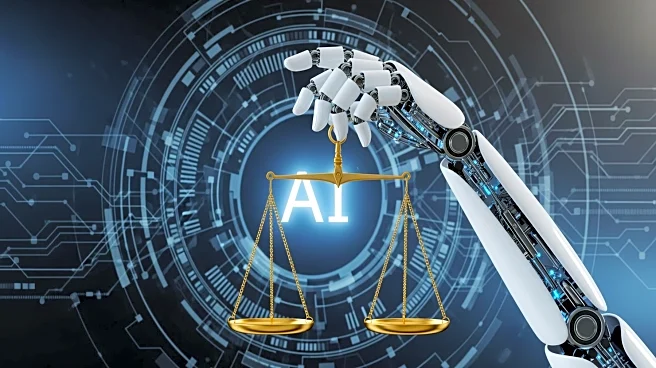What's Happening?
The legal industry is experiencing a significant shift as in-house legal departments increasingly adopt artificial intelligence (AI) technologies. A recent report highlights that two-thirds of in-house legal teams
are now utilizing AI or its beta versions, with over 90% citing efficiency as the primary benefit. This technological adoption is prompting a reevaluation of traditional billing practices and case staffing by outside law firms. Historically, in-house counsel have struggled to persuade outside firms to modernize their approaches, but the advent of AI may force these firms to adapt or risk losing business. The report also reveals that while many in-house lawyers are embracing AI, a surprising 80% are not pressuring outside firms to do the same.
Why It's Important?
The integration of AI in legal practices is poised to transform the industry by enhancing efficiency and potentially reducing costs. This shift could lead to a decrease in the reliance on outside counsel, as in-house teams become more self-sufficient. For law firms, the challenge lies in adapting to these changes to maintain their client base and revenue streams. The reluctance of some in-house lawyers to push for AI adoption by outside firms suggests a potential gap in expectations and capabilities that could impact the competitive landscape. As AI continues to evolve, it may redefine the roles and responsibilities within legal teams, emphasizing the need for strategic adaptation.
What's Next?
Law firms may need to reassess their business models and embrace AI to remain competitive. This could involve revising billing practices to reflect the efficiencies gained through AI, as well as investing in AI technologies to enhance service delivery. In-house legal teams might continue to push for more cost-effective solutions, potentially leading to a reevaluation of their relationships with outside counsel. The legal industry as a whole may witness a gradual shift towards more technology-driven practices, with firms that fail to adapt facing the risk of obsolescence.
Beyond the Headlines
The ethical implications of AI in legal practice are significant, as the technology raises questions about the balance between efficiency and the quality of legal services. There is also the potential for AI to impact the job market within the legal industry, as automation could reduce the need for certain roles. Additionally, the integration of AI may necessitate new regulatory frameworks to ensure that its use aligns with legal standards and ethical considerations.









